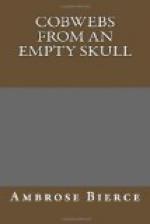A rat, finding a file, smelt it all over, bit it gently, and observed that, as it did not seem to be rich enough to produce dyspepsia, he would venture to make a meal of it. So he gnawed it into smithareens[A] without the slightest injury to his teeth. With his morals the case was somewhat different. For the file was a file of newspapers, and his system became so saturated with the “spirit of the Press” that he went off and called his aged father a “lingering contemporary;” advised the correction of brief tails by amputation; lauded the skill of a quack rodentist for money; and, upon what would otherwise have been his death-bed, essayed a lie of such phenomenal magnitude that it stuck in his throat, and prevented him breathing his last. All this crime, and misery, and other nonsense, because he was too lazy to worry about and find a file of nutritious fables.
This tale shows the folly of eating everything you happen to fancy. Consider, moreover, the danger of such a course to your neighbour’s wife.
[Footnote A: I confess my inability to translate this word: it may mean “flinders.”—TRANSLATOR.]
LXXIX.
“I should like to climb up you, if you don’t mind,” cried an ivy to a young oak.
“Oh, certainly; come along,” was the cheerful assent.
So she started up, and finding she could grow faster than he, she wound round and round him until she had passed up all the line she had. The oak, however, continued to grow, and as she could not disengage her coils, she was just lifted out by the root. So that ends the oak-and-ivy business, and removes a powerful temptation from the path of the young writer.
LXXX.
A merchant of Cairo gave a grand feast. In the midst of the revelry, the great doors of the dining-hall were pushed open from the outside, and the guests were surprised and grieved by the advent of a crocodile of a tun’s girth, and as long as the moral law.
“Thought I ’d look in,” said he, simply, but not without a certain grave dignity.
“But,” cried the host, from the top of the table, “I did not invite any saurians.”
“No—I know yer didn’t; it’s the old thing, it is: never no wacancies for saurians—saurians should orter keep theirselves to theirselves—no saurians need apply. I got it all by ’eart, I tell yer. But don’t give yerself no distress; I didn’t come to beg; thank ’eaven I ain’t drove to that yet—leastwise I ain’t done it. But I thought as ’ow yer’d need a dish to throw slops and broken wittles in it; which I fetched along this ’ere.”
And the willing creature lifted off the cover by erecting the upper half of his head till the snout of him smote the ceiling.
Open servitude is better than covert begging.




